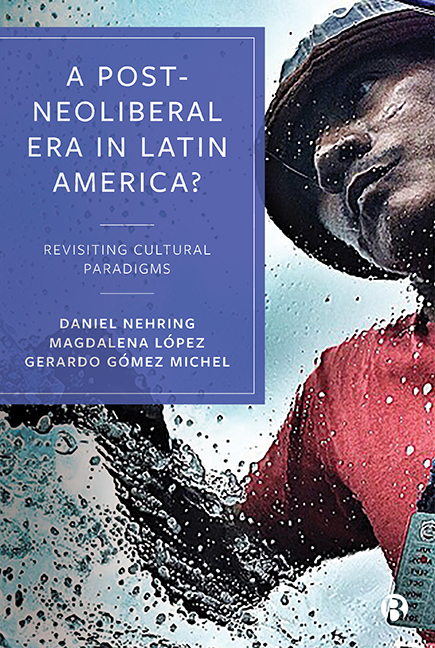Book contents
- Frontmatter
- Contents
- List of Tables and Figures
- Notes on Contributors
- 1 Introduction: Everyday Life in (Post-)Neoliberal Latin America
- 2 Imaginaries, Sociability and Cultural Patterns in the Post-Neoliberal Era: A Glance at the Argentinean, Paraguayan, and Venezuelan Experiences
- 3 Making Neoliberal Selves: Popular Psychology in Contemporary Mexico
- 4 From Uribe’s “Democratic Security” to Santo’s Peace Accords with the FARC: Hate, Fear, Hope and other Emotions in Contemporary Colombian Politics
- 5 Cine Bajo Tierra: Ecuador’s Booming Underground Cinema in the Aftermath of the Neoliberal Era
- 6 Neoliberalising Humanity: Culture and Popular Participation in the Case of the Street Market of Caruaru, Brazil
- 7 The Contribution of the Catholic Magazine Espacio Laical and the Constitution to the Cuban Public Sphere
- 8 Argentina: The Philosophical Resistance to the Conquest of the Soul1
- 9 Fleeing (Post-)Chávez Memories: The 1990s and the Black Friday Generation
- 10 Re-imagined Community: The Mapuche Nation in Neoliberal Chile
- 11 Neoliberalism and the Negotiation of the American Dream in Contemporary Latina Narratives
- 12 Bare Life in Contemporary Mexico: Everyday Violence and Folk Saints
- Index
1 - Introduction: Everyday Life in (Post-)Neoliberal Latin America
Published online by Cambridge University Press: 20 April 2022
- Frontmatter
- Contents
- List of Tables and Figures
- Notes on Contributors
- 1 Introduction: Everyday Life in (Post-)Neoliberal Latin America
- 2 Imaginaries, Sociability and Cultural Patterns in the Post-Neoliberal Era: A Glance at the Argentinean, Paraguayan, and Venezuelan Experiences
- 3 Making Neoliberal Selves: Popular Psychology in Contemporary Mexico
- 4 From Uribe’s “Democratic Security” to Santo’s Peace Accords with the FARC: Hate, Fear, Hope and other Emotions in Contemporary Colombian Politics
- 5 Cine Bajo Tierra: Ecuador’s Booming Underground Cinema in the Aftermath of the Neoliberal Era
- 6 Neoliberalising Humanity: Culture and Popular Participation in the Case of the Street Market of Caruaru, Brazil
- 7 The Contribution of the Catholic Magazine Espacio Laical and the Constitution to the Cuban Public Sphere
- 8 Argentina: The Philosophical Resistance to the Conquest of the Soul1
- 9 Fleeing (Post-)Chávez Memories: The 1990s and the Black Friday Generation
- 10 Re-imagined Community: The Mapuche Nation in Neoliberal Chile
- 11 Neoliberalism and the Negotiation of the American Dream in Contemporary Latina Narratives
- 12 Bare Life in Contemporary Mexico: Everyday Violence and Folk Saints
- Index
Summary
This book explores the cultural dynamics of neoliberalism and anti-neoliberal resistance in Latin America. While Latin American neoliberalisms and the region's transition—perhaps temporary—to post-neoliberalism have been extensively debated (Dávila, 2012; Flores-Macias, 2012; Goodale and Postero, 2013), extant research has largely focused on relevant political and socioeconomic processes. The cultural dynamics of neoliberalism, anti-neoliberalism and post-neoliberalism, in terms of the discursive construction of neoliberal common sense and the organization of everyday beliefs, norms, values, and systems of meaning, have received far less attention.
Together, the studies in this volume seek to address this gap. They pursue three objectives. First, they seek to explore how neoliberal narratives of self and social relationships have transformed everyday life in contemporary Latin America. Second, they examine how these narratives are being contested and supplanted by a diversity of alternative modes of experience and practices in a diversity of settings, in the context of anti-neoliberal and post-neoliberal sociopolitical programs. In this context, the studies in this book examine to what extent contemporary Latin America might in fact be described as post-neoliberal, given the crisis of political challenges to neoliberalism in societies such as Venezuela, Argentina and Bolivia. Third, the following chapters interrogate the discourses and cultural practices through which a societal consensus for the pursuit of neoliberal politics may be established, defended and contested.
Neoliberalism and post-neoliberalism in Latin America
At the beginning of the 21th century, nations such as Argentina, Bolivia, Brazil, Ecuador and Venezuela have attracted international attention for their forceful critique of neoliberalism and their pursuit of alternative developmental models. Until the turn of the century, neoliberal theories had dominated political and economic life at the global level (Harvey, 2005; Davies, 2014). The end of the neoliberal cycle of the 1990s in much of the Latin American region has led to what John Beverley (2011) called a post-neoliberal moment. However, these post-neoliberal political programs have recently entered a period of crisis. The beginning of this crisis was marked by the early death of Hugo Chávez in Venezuela (2013), and it has continued with the electoral defeat of Argentina's left-wing government in 2015, the escalating economic and political crisis in Venezuela, and the removal from office of Dilma Roussef in Brazil in mid-2016. The current social, economic and political unrest has been heavily intensified by the worldwide financial crisis that began in 2007–08 and its lasting repercussions.
- Type
- Chapter
- Information
- A Post-Neoliberal Era in Latin America?Revisiting Cultural Paradigms, pp. 1 - 20Publisher: Bristol University PressPrint publication year: 2019

